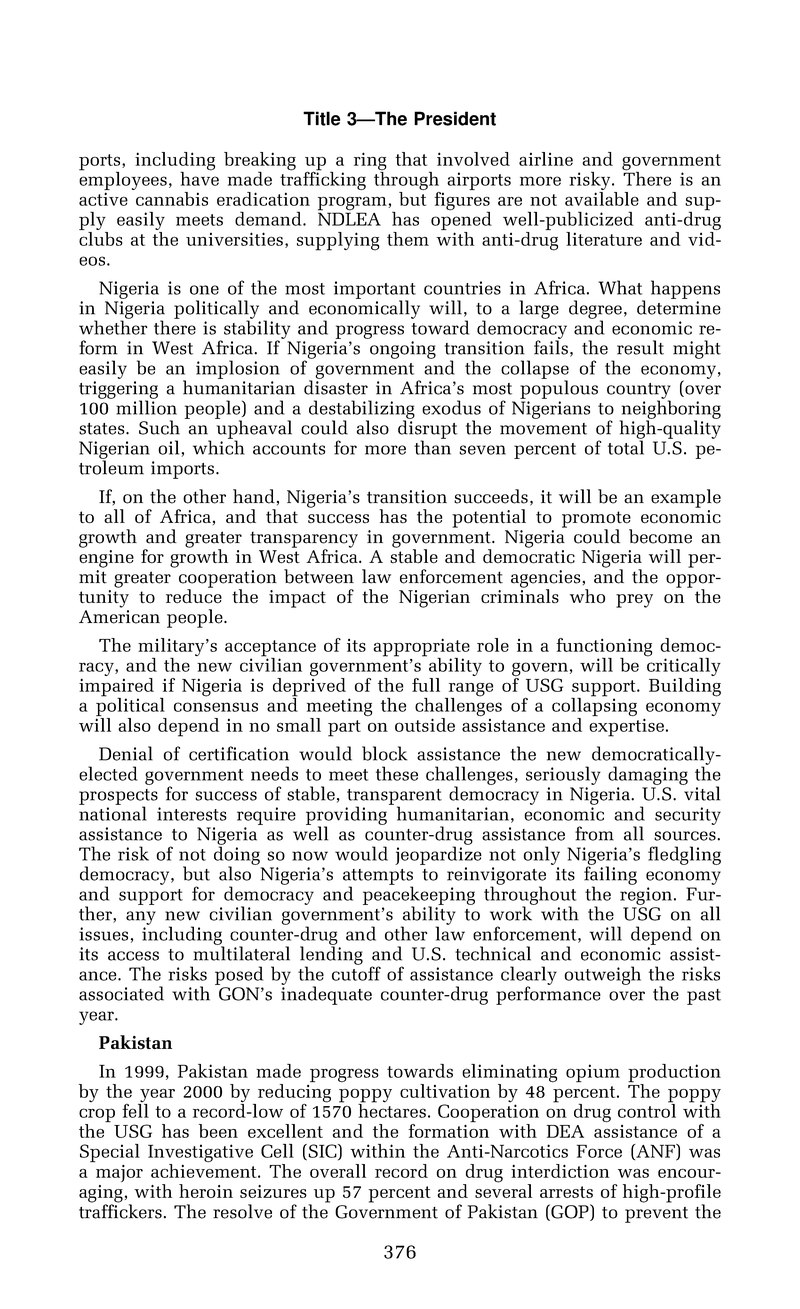Title 3--The President ports, including breaking up a ring that involved airline and government employees, have made trafficking through airports more risky. There is an active cannabis eradication program, but figures are not available and sup- ply easily meets demand. NDLEA has opened well-publicized anti-drug clubs at the universities, supplying them with anti-drug literature and vid- eos. Nigeria is one of the most important countries in Africa. What happens in Nigeria politically and economically will, to a large degree, determine whether there is stability and progress toward democracy and economic re- form in West Africa. If Nigeria's ongoing transition fails, the result might easily be an implosion of government and the collapse of the economy, triggering a humanitarian disaster in Africa's most populous country (over 100 million people) and a alestabilizing exodus of Nigerians to neighboring states. Such an upheaval could also disrupt the movement of high-qua]fly Nigerian oil which accounts for more than seven percent of total U.S. pe- troleum imports. If, on the other hand, Nigeria's transition succeeds, it will be an example to all of Africa, and that success has the potential to promote economic growth and greater transparency in government. Nigeria could become an engine for growth in West Africa. A stable and democratic Nigeria will per- mit greater cooperation between law enforcement agencies, and the oppor- tunity to reduce the impact of the Nigerian criminals who prey on the American people. The military's acceptance of its appropriate role in a functioning democ- racy, and the new civilian government's ability to govern, will be critically impaired if Nigeria is deprived of the full range of USG support. Building a political consensus and meeting the challenges of a collapsing economy will also depend in no small part on outside assistance and expertise. Denial of certification would block assistance the new democratically- elected government needs to meet these challenges, seriously damaging the prospects for success of stable, transparent democracy in Nigeria. U.S. vital national interests require providing humanitarian, economic and security assistance to Nigeria as well as counter-drug assistance from all sources. The risk of not doing so now would jeopardize not only Nigeria's fledgling democracy, but also Nigeria's attempts to reinvigorate its failing economy and support for democracy and peacekeeping throughout the region. Fur- ther, any new civilian government's ability to work with the USG on all issues, including counter-drug and other law enforcement, will depend on its access to multilateral lending and U.S. technical and economic assist- ance. The risks posed by the cutoff of assistance clearly outweigh the risks associated with GON's inadequate counter-drug performance over the past year. Pakistan In 1999, Pakistan made progress towards eliminating opium production by the year 2000 by reducing poppy cultivation by 48 percent. The poppy crop fell to a record-low of 1570 hectares. Cooperation on drug control with the USG has been excellent and the formation with DEA assistance of a Special Investigative Cell (SIC) within the Anti-Narcotics Force (ANF) was a major achievement. The overall record on drug interdiction was encour- aging, with heroin seizures up 57 percent and several arrests of high-profile traffickers. The resolve of the Government of Pakistan (GOP) to prevent the 376
�
